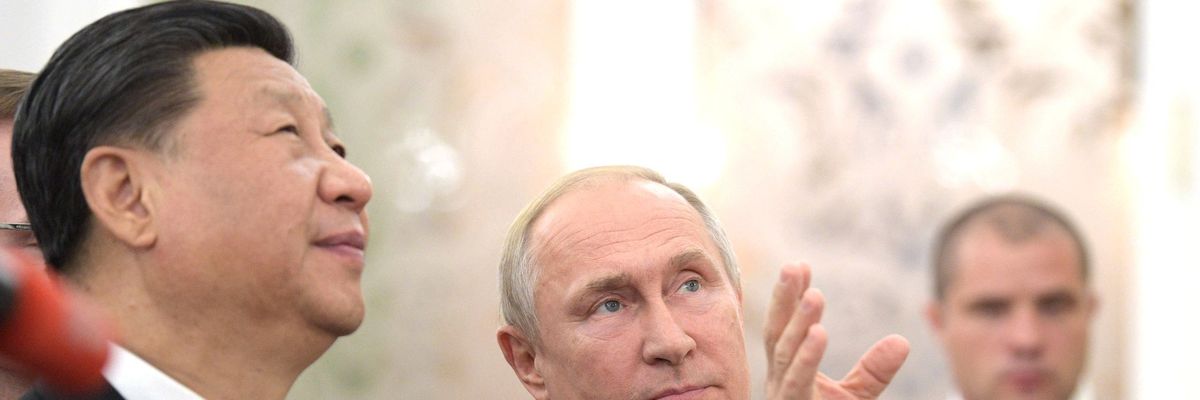The most popular foreign policy related activity in Washington this week is raising the alarm about Xi Jinping’s visit to Moscow and what it might mean for a Chinese-Russian alliance.
But this outcry threatens to conceal the complexity of the situation, and most importantly the freedom of action the U.S. still has to head off such an alliance. Using that freedom of action is going to require a more conciliatory, flexible, and imaginative foreign policy than we have seen in recent years. This will be a tall order, particularly as there are many in Washington who seem to wish to lock the U.S. into a full blown new cold war against a Russian-Chinese alliance.
The Xi visit reflects Beijing’s ongoing effort to uphold its close relationship with Moscow while, crucially, avoiding an unqualified endorsement of Putin’s invasion of Ukraine. In crafting this balancing act, Xi seeks to present China as a trustworthy, if not completely neutral, proponent of peace. This is the perspective presented in China’s recently unveiled twelve point position paper on Ukraine.
The paper implicitly counters Moscow by championing territorial sovereignty and opposition to nuclear threats. This is a position likely to appeal to neutral states. But the paper also refers to the need to respect the legitimate security interests of states, an obvious reference to Moscow’s stated concerns about its border security and the expansion of NATO.
Both Putin and Xi released statements at the end of meetings on Tuesday. Neither reflected any new or expanded positions on the relationship vis-a-vis Ukraine. Xi in fact, continued to insist that China "adhere to an objective and impartial position."
China has significant motives for trying to keep at least some distance from Moscow, including maintaining economically important links in Europe and keeping international credibility with neutral states. But rather than appreciate these motives and try to build on them, Washington has categorically condemned China for failing to explicitly condemn Putin’s invasion and demand Russia’s withdrawal from Ukraine. This approach puts China in the same box with Russia. Instead of building on Beijing’s hesitation to fully support Russia’s invasion of Ukraine, it simply pushes Moscow and Beijing closer together.
This position is made even more problematic by the fact that it undercuts Ukraine’s own efforts at triangulation. Zelensky has not aligned himself with the American-led stance, seeking instead to look for the positive in the Chinese position and do what he can diplomatically to keep China from full military support of Russia.
There is no question that Beijing’s resistance to condemning Russia’s invasion outright runs counter to its own stated support of national sovereignty and territorial integrity. But we should realize that it is in part the level of hostility being expressed by Washington toward China that drives this hypocrisy. So long as Beijing perceives a full-blown U.S. campaign to weaken China and overthrow the CCP — as strikingly illustrated by XI Jinping’s unprecedented recent comments on U.S. “suppression” — it is unrealistic to expect it to come out in full opposition to Russia, its most significant strategic partner in opposing such a campaign.
If the U.S. is unwilling to distinguish between Russia and China as challengers to American interests and international law, and persists in rhetoric and actions that seem to substantiate Beijing’s worst case assumptions about U.S. motives, it will give Xi Jinping little reason to put any pressure at all on Putin during his three-day visit to Moscow. This alone reduces the chances for peace. Indeed, contrary to our frequent protestations that Ukraine is fully in control of any peace process, the U.S. has already unilaterally rejected any cease fire that might emerge from Chinese efforts.
Even more dangerously, a U.S. position that seems to prejudge China as a full supporter of Russia’s worst instincts may have the opposite effect and encourage China to provide more extensive military support to Russia. Particularly if it appears Russia might actually lose the war in a decisive way; a China that sees Washington as an intractable enemy would have a strong incentive to prevent such a defeat of its most powerful ally against U.S. global influence.
To avoid this outcome, Washington needs to show more openness to the possibility that China might play some constructive role in the resolution of the war — or at least need not play a negative role. At minimum, it would require the U.S. to tone down its attacks on Beijing's motives and role in the international order. A U.S. willingness to reassure China on this score might give it more reason to keep its distance from Moscow.
But some in Washington might even welcome a closer alliance between China and Russia, despite the fact that it would be harmful to U.S. long-run strategic interests. From the perspective of domestic politics, driving China and Russia into a coalition of authoritarian states makes it easier to win support for a more militarized and more aggressive U.S. global posture based on the framework of a new cold war. For those who believe this more aggressive stance is needed for the U.S. to protect its global primacy, there are many advantages to making a conflict between the U.S. and a tight China-Russia alliance of autocracies appear inevitable.
But it’s not yet inevitable, and we should try to avoid making it so. For reasons obvious from a glance at a map, some of the most respected figures in U.S. foreign policy have long warned of the risks of a closer Russia-China alliance. As Zbigniew Brzezinski stated in his magnum opus The Grand Chessboard, “the most dangerous scenario would be a grand coalition of China, Russia, and perhaps Iran, an ‘anti-hegemonic’ coalition united not by ideology but by shared grievances.” As this possibility draws nearer, we need diplomats adroit enough to prevent it.
Fifty years ago, Kissinger split the China-Russia alliance and helped win the Cold War. Today, we should not play Kissinger in reverse.
















